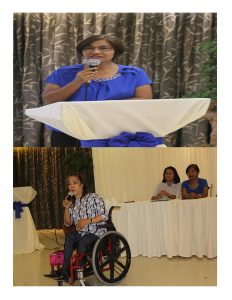
The Department of Social Welfare and Development affirms its commitment to Persons with Disabilities (PWDs) sector in their quest for accessible tourism on April 14, 2016 during the Seminar on How to Handle Persons with Disabilities in Tourism Industry.
The advocacy effort was spearheaded by the National Council on Disability Affairs (NCDA) in partnership with the Department of Tourism (DOT).
“Accessible Tourism for All” is a national campaign providing the policy guidelines for stakeholders on accessible tourism as provided in the National Tourism Development Plan (NTDP).
The said policy requires DOT accredited establishments such as restaurants, hotels, inns, apartels, pension houses, resorts and similar lodging establishments; tertiary hospitals, ambulatory clinics, spas, sports and recreational clubs/centers, museums, galleries, tourist land, water and air transport operators to comply with the pertinent provisions of R.A. 9442 on rights and benefits of PWDs, among others.
The seminar aimed to support the said mandate as the workforce behind the tourism industry were provided with knowledge on how to handle persons with mobility, hearing and visual impairments.
In her message, Ms. Lucia S. Alan, the Protective Services Unit Head of DSWD Field Office 02, cited that “tourists with disabilities are becoming an important part of the tourism market as shown by a study conducted by the European Union, in the US and in Australia, hence, we must seize this opportunity to serve an important and growing market, win new customers and increase revenue.”
Representatives from various tourism industries in the region participated in the said seminar as key persons from NCDA provided lecture on disability-related perspectives and key mandates on disability.
“Tourism for All” ensures tourist destinations, products and services are accessible to people regardless of their physical limitations, disabilities or age as long as they are able to travel and function independently in their socio-cultural and economic activities in the places where they want to visit. ### By: Gela Flor R. Perez, Regional Information Officer II

